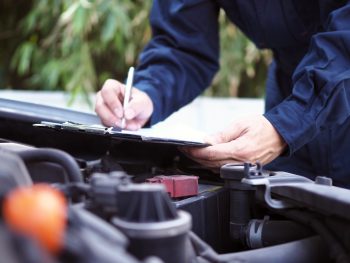The Government has confirmed that the first MOT test will remain at three years for now after a consultation revealed widespread condemnation.

The Department for Transport (DfT) has also committed to maintaining annual testing after the first MOT, rather than switching to every other year, but has said it will continue to work closely with industry stakeholders and drivers to establish a programme of longer-term reform for MOTs.
The major shake-up of the MOT regime for cars, vans and motorcycles was proposed in January 2023, accompanied by the consultation from the DfT and Driver and Vehicle Standards Agency (DVSA), which highlighted technological advancements such as hybrid, electric and self-drive vehicles.
At the time, the Government promoted the money-saving benefits of such a move and said the updates could “ensure roadworthiness checks continue to balance costs on motorists while ensuring road safety, keeping up with advances in vehicle technology, and tackling vehicle emissions”.
However, the move was slammed by many in the automotive sector, who pointed out that the first MOT and the annual testing thereafter play a crucial role in ensuring that vehicles on our roads are safe and well-maintained.
And some also highlighted that changes could actually end up costing motorists more. Analysis from the AA suggests that an annual MOT can potentially save drivers between £200 and £400, as picking up developing faults each year means drivers aren’t hit with higher repair bills further down the road.
It’s not the first time the Government has proposed changes to the MOT. A consultation on switching to a four-year cycle was run in 2017 and found the vast majority of respondents were opposed, forcing the plans to be scrapped.
Publishing its response to last year’s consultation, the Government said today’s announcement would ensure “motorists can continue to drive with peace of mind”.
Roads Minister Guy Opperman commented: “We have listened to drivers and industry, and keeping MOTs in their current form shows once again that we are on the side of motorists.”
There are some changes still planned though; the Government will further investigate how to better monitor diesel vehicle emissions through the DVSA. This will include whether testing should do more to ensure that diesel vehicles comply with emissions regulations.
It will also still explore whether further improvements could be made to the MOT for electric vehicles and will look into the transfer of some larger zero-emissions vans to more standard, car-style MOT testing – helping to remove a barrier to electric van take-up.
And the DfT will also monitor technological developments that could require MOT changes, such as advanced driver assistance systems.
The commitments to maintaining current testing intervals have been universally welcomed – while some reiterated their views on the changes being suggested in the first place.
RAC head of policy Simon Williams said: “It’s great news the madcap idea of changing the MOT from every year to every two has finally been consigned to the bin. This would have seriously compromised road safety and ended up costing drivers more money rather than less as it was supposed to do, due to dangerous issues going undetected and getting progressively worse. This is why the idea was so widely unpopular with the motoring public in our research.
“We look forward to hearing more from the Government on how the MOT will evolve in the future, both to accommodate the rising number of electric cars on our roads and improve the monitoring of dangerous emissions from combustion engines. We would also like to see the test change to help reduce the prospect of glare from headlights, as this is something the DVSA has previously said garages can find difficult to assess.”
Jakob Pfaudler, AA CEO, said: “AA polling showed drivers overwhelmingly (83%) supported the annual MOT for keeping their cars and other cars safe. With one in 10 cars failing their first MOT, we fully support the Government’s pragmatic decision to maintain the first MOT at three years and annually thereafter.”
The Society of Motor Manufacturers and Traders (SMMT) also welcomed the move.
Mike Hawes, SMMT chief executive, said: “Government and the automotive industry have worked together to ensure the UK has some of the world’s safest roads. The decision to retain the existing MOT system is the right one, helping maintain this proud record and giving drivers confidence in car and van roadworthiness. With vehicle technology continuing to evolve at pace in terms of both safety and environmental performance, we will maintain this collaboration with government and other stakeholders so that the MOT continues to be fit for purpose, helping Britain improve what is already a strong road safety record.”
And the Institute of the Motor Industry (IMI), which provided clear evidence that extending the date for the first MOT would significantly increase road user risk, said sticking with the current system was a wise move.
In particular, the IMI identified that the risks surrounding electric vehicles – which are heavier than ICE vehicles and cause heavier wear to their tyres – would be heightened if the first MOT date was extended. Evidence drawn from MOT testing records supplied to the IMI by the Department for Transport showed that comparative to petrol engine vehicles, electric vehicles are much more likely to fail their first MOT test.
Hayley Pells, policy lead at the IMI, added: “The decision to further explore modernising tests for electric and automated vehicles is a positive step towards addressing the unique challenges and advancements in vehicle technology. We also appreciate the focus on diesel emissions, which is crucial for environmental concerns. The conclusion of the consultation also underscores the need for ongoing adaptations in MOT testing to keep pace with rapidly evolving vehicle technologies and environmental considerations.”

